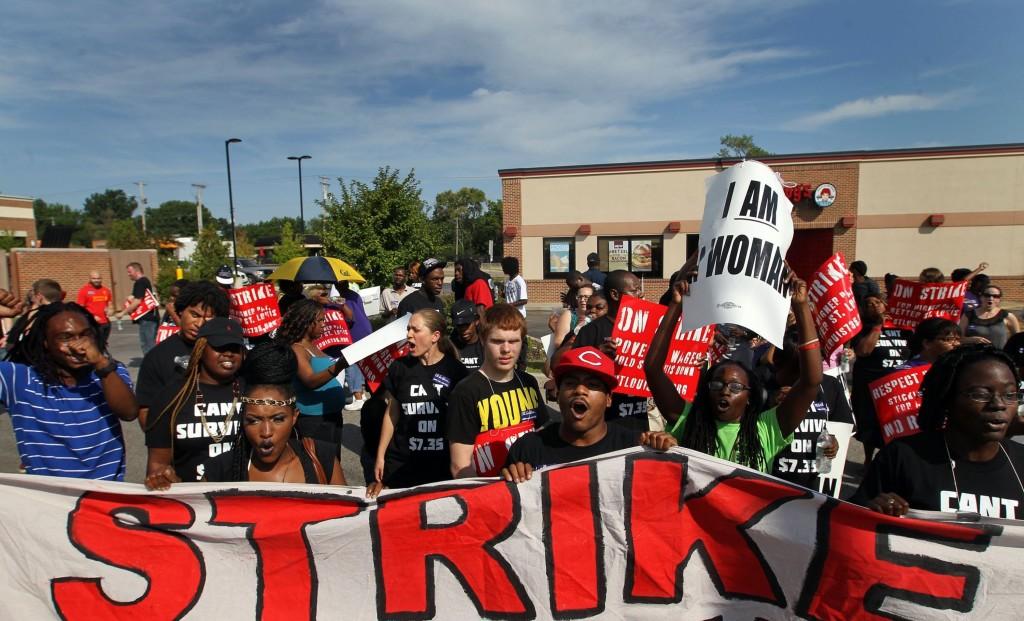It has been more than four years since the official end of the Great Recession; yet most American workers’ pay has not been increased. The cost of living is continuing to rise while salaries remain stagnant, making greater numbers of Americans susceptible to poverty.
Originally the federal minimum wage was enacted to keep American workers out of poverty and increase customer purchasing power in order to stimulate the economy. However, the value of the minimum wage has fallen sharply over the past 40 years.
The minimum wage was last increased on July 24th, 2009 when it rose from $6.55 to $7.25. Before this it had been stuck at $5.15 for 10 years. It has made it almost impossible to combat the decreasing value of the dollar when the federal minimum wage is raised so slightly and takes a while to increase. Currently the federal minimum wage is $7.25, translating to a mere $15,080 salary for a full- time year- round worker. Considering that the average American spends between $1,333 and $1,600 a year on gas (according to the American Automobile Association), $1,147.92 on electricity (according to the Energy Information Agency), and $20,000 dollars a year on a home mortgage on top of groceries and car payments it is impossible for someone to live off of this without assistance.
Peyton King is a senior at LHS and a full time employee. Unlike other employees, she is reminded constantly of both sides of the issue, seeing as her mother owns the business where she works. This is why she doesn’t believe in raising the minimum wage as most other full time workers do. She says while she is well aware of the hard work employees do, “small businesses can’t afford to pay out that much in labor.”
She has to pay for clothes, food, gas, and car insurance like other adults who support themselves; therefore, King is aware what it’s like to live off of minimum wage. She believes that it is on the person to support themselves, whether this means working two jobs or cutting back on spending.
Ten states have adopted the practice of indexing the minimum wage, which means adjusting it automatically each year to keep pace with the rising cost of living. This prevents workers from losing purchasing power each year. In 2013 these states saw their minimum wage automatically go up by 10 to 15 cents, benefiting nearly 1 million workers in these states. However, Maryland has not taken part in this practice and, in result, is allowing the erosion of the minimum wage each year.
One of the supporters for raising the wage is Maryland governor Martin O’ Malley. This November The Baltimore Sun reported that O’ Malley issued a call for a higher minimum wage in Maryland, urging supporters to join him in a “long and difficult effort” to win approval for an increase from the current hourly rate of $7.25. In a letter sent out by his federal political action committee, O’Malley called for supporters to sign a petition urging an increase, saying it is the way to “give dignity to every Maryland family that works hard and plays by the rules.”
Douglas F. Gansler, Attorney General and 2014 Candidate for governor, agrees with O’ Malley’s viewpoint. In an interview with The Washington Post, he argued that raising the minimum wage to $10 an hour is “the morally correct thing to do and the economically sound thing to do.” He followed this by saying “Here in Maryland, we’re a progressive state. We ought to take care of the people who work every day and make sure that they make enough money to actually be able to live and survive in our economy.”
Gansler argued that businesses will gain from paying employees higher wages. He believes that it will reduce turnover and make employees more loyal to the company.
Some counties such as Prince Georges and Montgomery have recently raised their minimum wages. If Maryland doesn’t reciprocate, the state will be very negatively impacted. More people are going to look for employment in these counties, which will cause the amount of workers in Maryland to fall. Why would anyone want to work in Maryland for $7.25 when they could travel a little further to work for $11.50 an hour?
Raising the minimum wage would give workers more money to spend, therefore putting money back into the economy. This is extremely crucial to our society because the United States are in such a bad state of debt.
President Barack Obama recently called for an increase in the current federal $7.25 wage to $9 per hour. He believes doing so would move many Americans out of poverty and also boost the income of many minority communities. On top of this, he wants to have the wage automatically adjusted to inflation. This would boost the earnings of millions of people who work in low-wage positions around the country.
Maryland is not the only state fighting for an increase in minimum wage. Workers across the country have staged protests demanding wage increases. While Maryland has had many petitions trying to enact an increase, so far none have been passed. Other states have much higher minimum wages than Maryland but why should this be so, do they work any harder than Marylanders? California’s minimum wage is $8.00 an hour; Illinois’s $8.25; and Washington’s is a high $9.19 an hour.
According to a Gallup poll, three-quarters of Americans want to increase the minimum wage, while 22 percent oppose it.
While there are many beneficial aspects of raising Maryland’s minimum wage, there are also some negative impacts.
In the movie The One Percent, filmed by Jamie Johnson, business owners featured in the film revealed that if the United States raises the minimum wage, more companies will move their operations overseas where they can pay workers less to do the same work. This would result not only in American workers being laid off, but also aid foreign countries that use child labor and abuse workers.
In an interview with the Decatur Daily, Gloria Adams, owner of a local business, said “I would have to rethink the number of hours I use someone a week or month if it increases. I also understand they’re worth it.”
While a majority of business owners believe that their employees are worth the pay increase, they also are looking out for themselves. They are aware that having to pay workers more money will negatively impact their business.
House Speaker John A. Boehner stated in an interview with Pittsburgh Post-Gazette “when you raise the price of employment, guess what happens? You get less of it.” The unemployment rate in 2007 was 4.6% compared to a 9.3% in 2009. The poverty level was also significantly higher in 2009 and was the highest since 1994. While employees that already had jobs were receiving more money, businesses didn’t want to spend any more than they had to therefore they had significantly less hires.
The minimum wage is set just as that—the minimum. Some people may believe that $7.25 is a fine starting pay because of future bonus’s and pay increases; however, this is not the case with all businesses. A lot of employers start you at this rate with the given notion that you will receive a pay increase. However, they don’t say when you will receive a raise or how much it will be for. There are instances where employees have worked at a company for two years and have only received a 25 cent raise. Also, other businesses may reel you in because they pay higher than minimum wage but in return are reluctant to give raises.
Bob Contarino, owner of the Mount Airy Ledos, has a very strong opinion on the subject that most other employers would agree with. He believes that raising the minimum wage wouldn’t have that significant of a change on the economy. He said that if businesses paid employees more they would raise the prices of their products in order to maintain a positive income. This would stop consumers from having more money to spend and wouldn’t provide any benefit to the economy. Also, he believes that giving workers more money would only cause inflation therefore putting the economy into an even worse situation.
Steve Jaffe, local business owner of Jaffe Electric, agrees with Contarino’s statement. He added that the government is in such a bad state of debt, not only because officials are spending more money than the country has, but also due to all of the welfare programs. Steve Jaffe believes that the programs encourage Americans that they don’t need to work and they can rely on the government for an income. He said, “Welfare programs allow the hard earned money to be taken from the working class and given to people who are too lazy to make their own money.” He says this is why a lot of Americans are poor and unemployed and that raising the minimum wage wouldn’t change that.
Whether or not the minimum wage should be raised is a very controversial issue. There are numerous arguments that reveal what the positive and negative effects of changing the wage would be. Whether the government decides to raise the wage in Maryland or not, something needs to be changed. The rich are becoming richer and the poor are becoming poorer. Citizens who used to make up the middle class are now falling in to the cracks of the lower class and there is nothing as of now stopping this. It is clear that our economy is not working and a change must be made before the one percent is the only people left standing.















